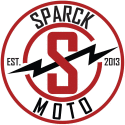I saw this in the CB450 DOHC groups. I basically picked out the rusted pits and then soaked it in Navel Jelly until the pits had no rust left in them. I then thinly applied some metal epoxy and sanded it smooth with 320 then 600 grit sandpaper. A quick buff with some metal polish finished it up. I replaced the rubber seal that goes around it with a new one. What do you guys think? There is no load on the epoxy, its just provides a smooth surface for the seal.

We noticed you are blocking ads. DO THE TON only works with community supporters. Most are active members of the site with small businesses. Please consider disabling your ad blocking tool and checking out the businesses that help keep our site up and free.
You are using an out of date browser. It may not display this or other websites correctly.
You should upgrade or use an alternative browser.
You should upgrade or use an alternative browser.
Resurfaced Brake Piston, What You Guys Think?
- Thread starter souperman
- Start date
colpumpkinnuts
Banned from public transportation
That is outstanding. Let us know how it works.
should work great unless the break fluid eats the epoxy?
jb weld might work better? or i was thinking solder if you coulg get it to stick and file/sand it down
i wonder if this would work on old forks that are rusty/pited my dad messes with a lot of old mx bikes and parts are sometime hard to come buy for them?
jb weld might work better? or i was thinking solder if you coulg get it to stick and file/sand it down
i wonder if this would work on old forks that are rusty/pited my dad messes with a lot of old mx bikes and parts are sometime hard to come buy for them?
Swagger
Putting boot to ass since 1967!
I've heard of doing this also, don't see why it wouldn't work though I too wonder if JB wouldn't be a safer bet...
Another alternative, while more labor intensive would be to have the OD of the piston turned down a few thousandths and chrome plated to build it back up. Good hard chrome is REALLY hard and low friction so it should work out.
Let us all know how this holds up....
Another alternative, while more labor intensive would be to have the OD of the piston turned down a few thousandths and chrome plated to build it back up. Good hard chrome is REALLY hard and low friction so it should work out.
Let us all know how this holds up....
The epoxy I used was a JB Weld knock-off. It says it's made for metal and has little flakes of metal bits in it you can see when you sand it super-thin. I hadn't thought about the epoxy being eaten away by brake fluid, I'm hoping it will be good enough. I put a caliper on it this evening and it is within the service specs. If this works maybe I'll move this to the $50 mod thread...
Bad news, it looks like the epoxy I picked will not work. I still think this idea is sound, you just need to be sure to use real JB Weld and not some knockoff. I used Superglue brand Metal Epoxy that was only rated to 300 degress F, I believe JB Weld is good for up to 600 or so. To test this I put the piston in a 500 degree oven for a bit. The epoxy didn't melt, but it became rather crumbly and brittle. This may not have led to a failure but it's not something I'm comfortable with in my front brake. At this point it will be a bitch to get the old epoxy out and put JB Weld in, so I'm probably just going to replace the piston.
Better safe then sorry...
Better safe then sorry...
Uniac
Been Around the Block
I would honestly go to a hydraulics shop and have them make you a new piston from chromed rod. I say this because i used to work in one, the problem is if you don't get the pits perfectly out, they'll eventually tear your seals. This is the cause of most hydraulic cylinders bypassing.
The material should be cheap. But then again, i'm not familiar with how available these parts are,so it may just be cheaper to buy a new caliper.
Whichever you choose, good luck.
The material should be cheap. But then again, i'm not familiar with how available these parts are,so it may just be cheaper to buy a new caliper.
Whichever you choose, good luck.
Swagger
Putting boot to ass since 1967!
That would be the ultimate solution.
I've been wondering about different piston materials after getting to mess around with a caliper from a mid 90's Yamaha endurance racer recently. It's piston was made of what looked and felt like graphite or some kind of carbon suspension. Extremely light! There was a thin metal "skin" inside that I assume was there to help deal with pressure.....but I dunno.
I got to thinking about thinks like aluminum, 7075 is about the same strength as good steel and obviously lighter. With hard anodizing it would stand up pretty well against abrasion so I can't see that being an issue. Anyone with serious brake system knowhow wanna chime in?
I've been wondering about different piston materials after getting to mess around with a caliper from a mid 90's Yamaha endurance racer recently. It's piston was made of what looked and felt like graphite or some kind of carbon suspension. Extremely light! There was a thin metal "skin" inside that I assume was there to help deal with pressure.....but I dunno.
I got to thinking about thinks like aluminum, 7075 is about the same strength as good steel and obviously lighter. With hard anodizing it would stand up pretty well against abrasion so I can't see that being an issue. Anyone with serious brake system knowhow wanna chime in?
Joksa
Been Around the Block
Swagger said:I've been wondering about different piston materials ...
Like phenolic(?)
http://forums.sohc4.net/index.php?topic=37883.0

I recieved my phenolic brake piston today from Keven on the SOHC 4 forums. It looks to be a perfect fit. They are a brown color and don't have any metal on them like the above picture. It is just a single machined piece. PM for his email if any of you guys are interested in one. He was very reasonably priced and shipped quickly.
rockcitycafe
I make things.
I wonder why aluminum isn't used for pistons... it seems like it would be really easy to turn a piece of aluminum to the piston dimensions, and just polish the outside really well...
Heat might be an issue? Aluminum is a great conductor of heat and would get the brake fluid boiling hot pretty easy I'd imagine. One cool thing about phenolic pistons is they don't conduct heat to the fluid supposedly. I like the idea of turning one out of stainless myself, that would last forever.
rockcitycafe said:I wonder why aluminum isn't used for pistons... it seems like it would be really easy to turn a piece of aluminum to the piston dimensions, and just polish the outside really well...
Roustabout
Been Around the Block
rockcitycafe said:I wonder why aluminum isn't used for pistons... it seems like it would be really easy to turn a piece of aluminum to the piston dimensions, and just polish the outside really well...
The Brembo caliper on my GP bike had anodized aluminum pistons. They have been using aluminum for quite some time
DrJ
Over 1,000 Posts
rockcitycafe said:I wonder why aluminum isn't used for pistons... it seems like it would be really easy to turn a piece of aluminum to the piston dimensions, and just polish the outside really well...
Maybe aluminum is more likely to expand and contract due to temperature changes? Just a guess.



